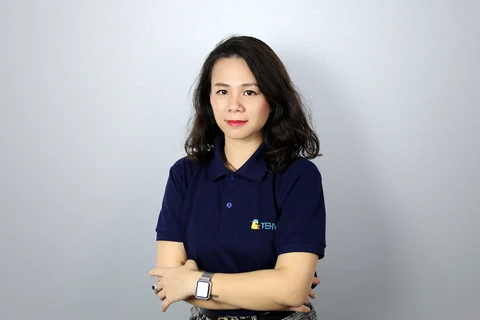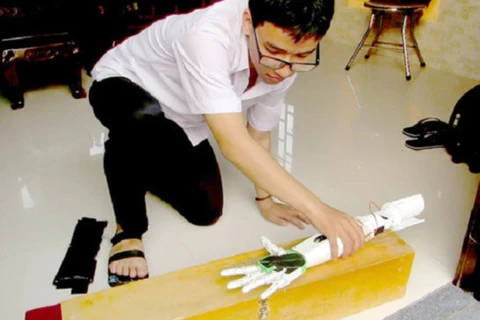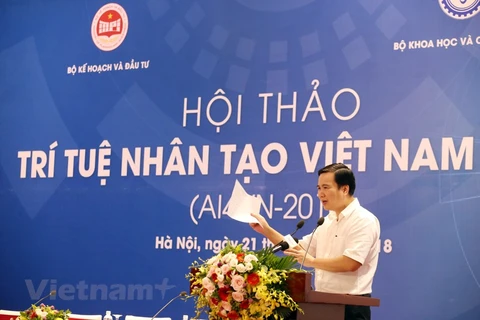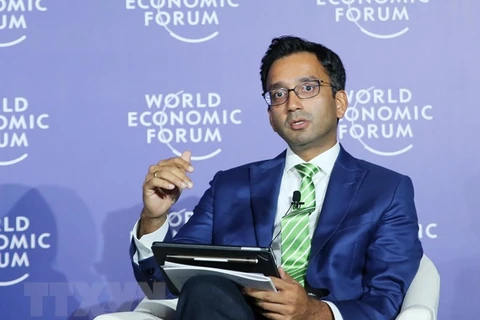 A survey of 1,100 IT workers in July by the human resources consultant Navigos Group reveals that up to 25 per cent of surveyed people have attempted to work abroad (Photo: aptechvietnam.vn)
A survey of 1,100 IT workers in July by the human resources consultant Navigos Group reveals that up to 25 per cent of surveyed people have attempted to work abroad (Photo: aptechvietnam.vn) Hanoi (VNS/VNA) - By the time they arrive at university, it is too late for students to start learning programming, according to Google Brain Research Scientist Le Viet Quoc, who argues that coding should be taught at high schools and become a larger part of the curriculum.
As artificial intelligence (AI) is forecast to boom in the near future, leading Vietnamese experts in science and technology say the country has potential to thrive once human resources are improved
Citing China’s three-year action plan for AI, Quoc said that Vietnam should accelerate investments into developing human resources, building an open database and creating connections among domestic universities and international academia.
“Instead of studying computer science like before, we should focus on machine learning or AI, algorithms and databases,” he said.
According to Quoc, it is also essential to form an elite core of experts who are able to bring innovations back to Vietnam.
Vu Duy Thuc, CEO of Ohmnilabs, told Thanh nien (Young people) newspaper that AI has a wide range of application in Vietnam.
“AI can help improve agricultural productivity and enhance labour safety but not completely replace the roles of farmers,” he stressed.
Vietnam, however, is on the edge of a brain drain, especially in the technology industry.
A survey of 1,100 IT workers in July by the human resources consultant Navigos Group reveals that up to 25 percent of surveyed people have attempted to work abroad. Half of them said they would accept an invitation to work for foreign start-ups in new technologies, including AI.
AI is also on top three fields in which people surveyed chose to launch a business and leads the top five technologies in which people expressed interest, followed by blockchain, data science, machine learning and cyber security.
While 60 percent of surveyed people said that their companies paid attention to AI, this emerging technology has had insignificant applications at domestic enterprises.
Google Deepmind Research Scientist Bui Hai Hung said that many Vietnamese people worked in the field of AI all around the world. Some of them are experts at leading technology corporations including Google, Facebook and Microsoft or at prestigious universities. Others choose to launch start-ups.
“Although there are Vietnamese AI experts, the country has not been recognised on the world map of this industry,” said Hung.
With the high global demand for human resources – 1 million workers, while only some 10,000 people are qualified – the industry offers a huge opportunity for countries including Vietnam, Quoc said.
Responding to the threat of brain drain in technology, Gaku Echizenya, CEO of Navigos Groups, recommends enterprises produce talent management policies and create favourable conditions to generate innovations.
“Besides enterprises’ efforts in speeding up in the technology race, Vietnam’s Government should open more platforms for the tech community to exchange experiences and experiment with new innovations,” he said.
Deputy Minister of Science and Technology Bui The Duy said that Vietnam would gather scientists into groups to accelerate research into AI and develop an innovative and strong network of AI in the country to catch the wave of the emerging technology.-VNS/VNA
VNA
























